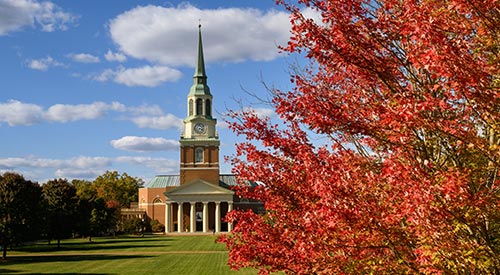Anthropology

Anthropology Degree
Bachelor of Arts, Minor
Program Type:
Major, Minor
Career Path:
Humanities
Program Site:
College or School:
Why study Anthropology?
Anthropology majors study humankind, from its beginnings millions of years ago to the present day. It is one of the most versatile disciplines in the College, is the principal academic and practical resource for multi-cultural awareness in the University and surrounding communities. That’s a refined way of saying we dig difference. Literally.
- Anthropology majors have also declared minors in nearly every minor offered at Wake Forest in the past decade, ranging from Entrepreneurship and Global Trade and Commerce to Linguistics.
- One of Wake Forest’s greatest campus treasures is the Timothy S.Y. Lam Museum of Anthropology, the only museum in North Carolina dedicated to the study of global cultures.
The Anthropology degree is offered as a Bachelor of Arts (B.A.) and a minor.
What classes would I take?
Our model and curriculum educate the whole person and often help students discover interests they had never previously discovered. Students generally take 100-200 level courses during their first year of college, while registering for higher level courses as upperclassmen.
Sample courses* that you will take in Anthropology include:
100-200 level
- Introduction to Archaeology
- Introduction to Biological Anthropology
- Introduction to Cultural Anthropology
- Language, Culture, and Power: Linguistic Anthropology
300 level
- Anthropological Theory
- Artifact Analysis and Laboratory Methods in Archaeology
- Human Osteology
- Individual Study
* Course availability and offerings can change at any time. Refer to the Academic Bulletin to view all major requirements.
What kind of experience will I gain?
The broad focus within the Anthropology major is especially valuable to students seeking to develop expertise in planning, decision-making, and management. Anthropology’s scope and intellectual perspective prepares students to make objective, far-sighted decisions at the professional level in any career field, either at home or abroad.
Students in this program will develop the following skills:
- Ability to summarize information
- Attention to detail
- Communication
- Conducting field studies
- Interviewing
- Planning projects
- Sampling, gathering, and organizing data
- Surveying
- Understanding of different cultures and diversity
- Writing
Are there extracurricular activities?
Joining a club or organization is a great way to get involved and do more with your major. Our Anthropology students participate in the following programs:
What kind of job can I get?
Careers that often interest Anthropology majors, and fields our graduates work in, include:
- Archeologist
- College professor
- Crime scene investigation
- Environmental anthropologist
- Medical anthropologist
- Museum curator
- Positions in defense and national security
- Public administration
Careers enjoyed by recent Anthropology graduates include brand director of Benchwarmers Bagels; data analysts for the Centers for Disease Control and Prevention; museum curators; and U.S. Army Special Forces officers.
Related Programs

Majors & Minors
Choose from more than 50 majors and over 60 minors to find your perfect fit.

Life at Wake
Take a moment to explore all the student experiences that make Wake Forest unique.

Virtual Tour
Can’t make it for a visit? No problem! Let us show you around campus virtually.

Keep in Touch
Let us know you’re interested in Wake Forest and we’ll do the rest.

Visit Campus
You truly can’t appreciate the beauty of our campus until you experience it for yourself.

Apply
Want to be considered for our next class of Demon Deacons? Here’s how to get started.
